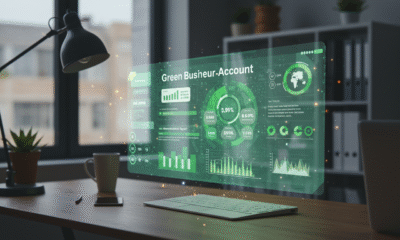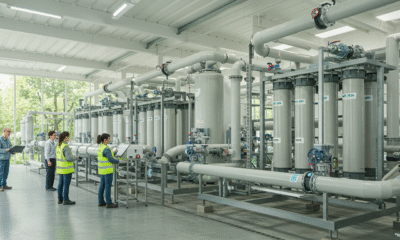

Editors Choice
5 Ways Smart Buildings Help Create a Greener World
More businesses are trying to embrace eco-friendly practices. One of the many ways that businesses are going green is by investing in smart buildings. Many experts argue that smart buildings are the future of sustainability.
Smart buildings integrate the IoT and technology to offer solutions to a few age-old problems of inefficiency and overspending in building use and construction. Within these smart buildings, every system is connected, from lighting and security, to air conditioning. This results in dramatic savings, and it is a far more effective and efficient approach to meeting green goals.
How much can smart buildings help in the quest for a greener future? One analysis by SpiceWorks showed that they can reduce emissions by 60% in residential buildings and 59% in commercial buildings. This is a substantial transformation for companies striving to go green.
With sensor use, such as people counters and occupancy, actionable data relating to how a building is used is easy to collect so that it can perform better. There are 5 key benefits associated with smart buildings:
#1 Lower Energy Consumption
The figures vary and usually depend on buildings and systems, but it is possible to lower energy consumption by around 5% to 35% in a building when using smart technology. This translates to an even higher reduction in the carbon footprint as the SpiceWorks source cited above indicates. This can also result in dramatic savings and a more effective and efficient approach to reaching green goals.
#2 Enhance Building Efficiency
Unobtrusive sensors can offer anonymous data relating to how a building is used. This will enable the smart system to perform adjustments when it comes to where light and heat are required, as an example, and infrastructure use like air conditioning.
Sensors can also be used to identify underused and overused areas in a building. This provides an opportunity to optimize the utilization of space, which can help to facilitate growth.
#3 Predictive Maintenance
Costs relating to maintenance can become substantial when they are handled manually. Yet without any maintenance, the equipment in a building would require a lot more frequent replacements, which could take a big chunk out of the budget. Smart buildings allow for predictive and simpler maintenance.
Sensors can also detect the performance of the building, followed by activating maintenance procedures well before alerts are triggered. When using more insightful overviews of how a building operates and is used, it becomes easier to execute maintenance procedures at the correct time.
#4 Increase Productivity
Smart buildings are designed specifically to deliver more comfortable experiences for the occupants. They can promote raising standards or ensuring safety and health considerations have been met, and ensure these are all implemented in the most cost-effective way.
Smart buildings can make people in a building more productive in the way of constantly monitoring use in the building and adjusting systems so that the occupants can access the facilities they need.
#5 Improved Use Of Resources
Data that is generated by smart buildings offer critical insights that you can feed into planning while making sure resources are used more efficiently. This removes having to rely on anecdotal data or guesswork since this will be replaced with real-time, informative, and genuine intelligence.
All of this can benefit a business by increasing efficiency, making a better run business and improving a businesses green credentials and helps with protecting their business reputation in the world.
Smart buildings create a greener world and one that future generations will be happy to thank you for. They are also helping drive the transition to eco-friendly urban planning.


 Environment12 months ago
Environment12 months agoAre Polymer Banknotes: an Eco-Friendly Trend or a Groundswell?

 Features11 months ago
Features11 months agoEco-Friendly Cryptocurrencies: Sustainable Investment Choices

 Features12 months ago
Features12 months agoEco-Friendly Crypto Traders Must Find the Right Exchange

 Energy11 months ago
Energy11 months agoThe Growing Role of Solar Panels in Ireland’s Energy Future



























